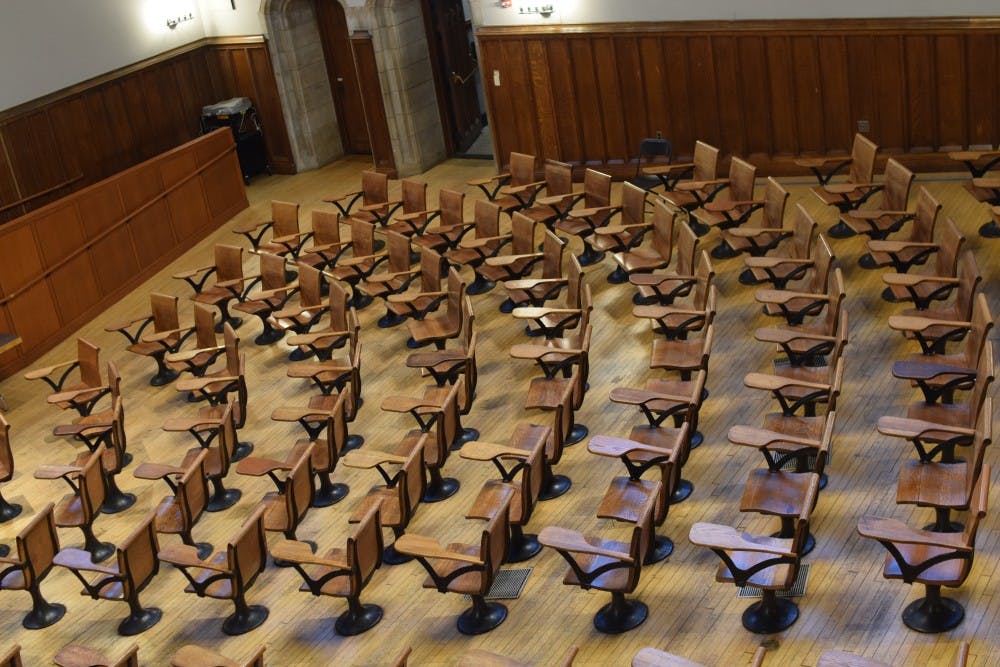Though Princeton has just admitted its class of 2024, we are only a few short months away from the beginning of the next admission cycle. In addition to forcing school closures across the country, COVID-19 has caused the postponement of college entrance exams (SAT/ACT) until deep into the summer, if not later.
In response to this uncertainty, many universities have modified their admissions policy. Vassar College and Boston University, among others, have elected for a one-year test-optional policy for applicants, and Tufts University has gone further, enacting a three-year trial. Princeton has yet to announce any changes.
COVID-19’s disruption to this year’s admissions cycle affords the administration an opportunity to examine and reform its standardized testing policy in general. This Board not only recommends a move away from requiring standardized testing for the 2020–21 admissions cycle, but also urges a permanent shift beyond the coronavirus pandemic.
Since their inception, these exams have pursued a pseudo-scientific notion of “intelligence,” uniformly measurable across U.S. college applicants. Analyzing the army mental tests from World War I in 1923, Princeton psychology professor Carl Brigham ’1912 GS ’1916 claimed “[the tests] had proven beyond any scientific doubt that, like the American Negroes, the Italians and Jews were genetically ineducable. It would be a waste of good money to even attempt to try and give these born morons and imbeciles a good Anglo-Saxon education, let alone admit them into our fine medical, law, and engineering graduate schools.” Three years later, Brigham adapted these same tests into the Scholastic Aptitude Test (SAT) for the College Board.
Almost a century after its invention, the SAT and similar tests have continued to purport themselves to be necessary and inseparable parts of the college admissions process. The assumption is that across society, this inherent “aptitude” must be evenly distributed along a normal curve — a select few are extraordinary, most are average, and a few are less able.
Rather than being evenly distributed, however, high test scores are concentrated in pockets of privilege. Students with more wealth attend better schools with more resources and have access to private tutoring and test preparation materials. They are also more likely to have parents or mentors with the time and pull to advocate for learning accommodations. These students tend to be white. A recent study found that majority-white school districts receive $23 billion more than majority non-white school districts in the United States. In practice, this means that every student in a majority white district receives $2,226 more than a student in a non-majority white district.
These inequalities are reflected in test performance. Students with more access to education and preparatory resources get better standardized testing scores on average than their counterparts. The monetary and educational costs necessary for high performance prove to be barriers to students who cannot afford the resources, as evidenced by the persistent gap in scores between black and white students. When those scores are a part of college admissions decisions, colleges support wealth-based social stratification and inequity.
SAT scores are poor measurements of merit. The College Board’s own failed attempts to formulate counter-balancing scales of adversity are remarkable only insofar as they concede that societal factors influence test scores. Despite myriad attempted reforms, from doing away with bizarre vocabulary terms to adding adversity scores, the SAT generally concentrates privilege among those who already have it.

There are better ways of assessing an applicant’s worthiness. Other aspects of the application process, such as transcripts or recommendations, can reveal more about an applicant’s diligence and hard work. The University already claims to take a holistic approach to admissions.
Given that this Board finds that SAT/ACT scores are indicators of wealth and reinforce racial and class biases, a majority of us see no reason for the tests to remain a part of undergraduate admissions at Princeton. A standardized test score, crudely dividing prospective students on an imaginary scale of intelligence, does no one justice. The University does not need standardized exam scores to craft an incoming class that is rich in academic drive and diverse in backgrounds, passions, and talents. Though some members of the Board do not hold that the University should immediately take such a drastic step, the Board unanimously agrees that the submission of test scores should, at the very least, not be required.
Mandating a test-optional policy is not a novel development and pre-dates the current pandemic. The University of Chicago implemented a test-optional policy in 2018, noting that, in many cases the “SAT or ACT score does not fully reflect [student] academic preparedness or potential.” Bowdoin College, Smith College, and Wesleyan University are among dozens of schools that have elected to use this policy in their applications, citing similar reasons.
We call on Princeton to follow in their footsteps. The current pandemic presents an unparalleled opportunity for us to lay the groundwork for a more equitable system.

144TH EDITORIAL BOARD
Chair
Zachariah W. Sippy ’22
Members
Benjamin Ball ’21
Shannon E. Chaffers ’22
Rachel Kennedy ’21
Kate Lee ’23
Madeleine Marr ’21
Jonathan A. Ort ’21
Elizabeth Parker ’21
Emma Treadway ’22
Ivy Truong ’21
Cy Watsky ’21
The 144th Editorial Board welcomes your comments and thoughts. Reach out to us at edboard@dailyprincetonian.com.








